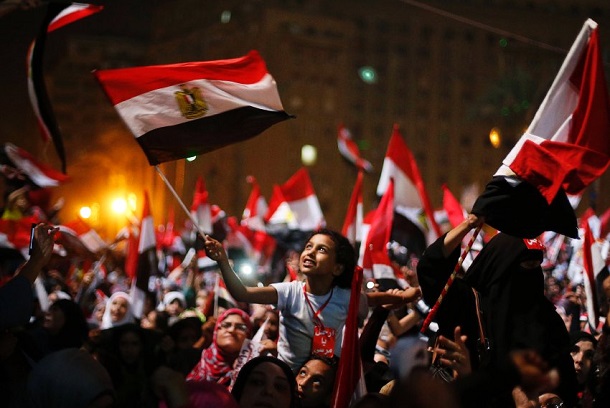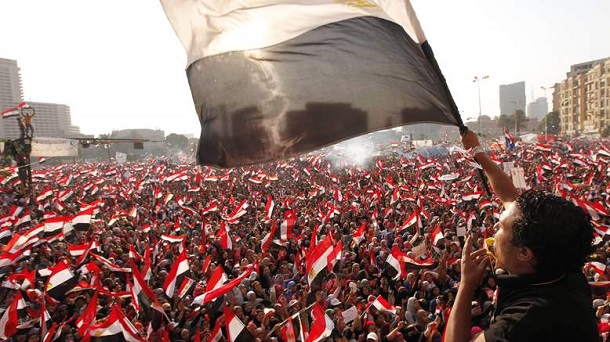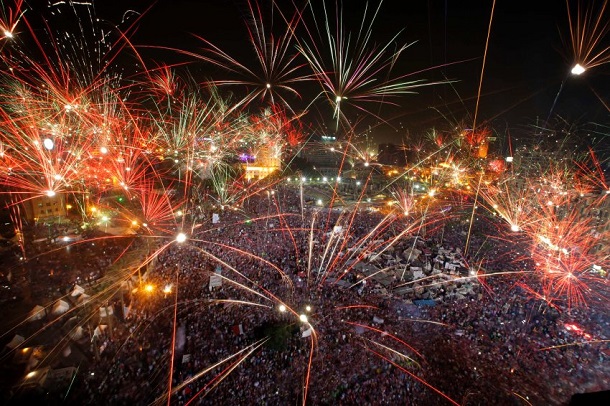Egypt’s army is holding ousted potential islamist dictator Mohamed Morsi, while a new interim leader is to be sworn in.
Milllions celebrated all night while as Mohamed Morsi was ousted only a year after he became Egypt’s first democratically elected president.
Former President Morsi and his Muslim Brotherhood allies have blasted the army’s intervention as a “full coup” by the generals.
The Islamist leader’s forced exit also prompted clashes across Egypt that left at least 14 people dead and hundreds wounded.
The “second revolution” – after Arab Spring uprisings that led to the overthrow of Hosni Mubarak in 2011 – leaves Egypt’s 84 million people deeply divided.
Fearing a violent reaction by Mr Morsi’s Islamist supporters, troops and armoured vehicles deployed in the streets of Cairo and elsewhere, surrounding Islamist rallies.
Mr Morsi was being detained at the Defence Ministry, according to a senior member of the Muslim Brotherhood.
Both the head and deputy chief of the Muslim Brotherhood have also been arrested, with warrants issued for 300 members of the political party.
In a televised address, the commander of the armed forces, General Abdul Fatah Khalil al Sisi, said Mr Morsi had “failed to meet the demands of the Egyptian people”.

Flanked by military officials, Muslim and Christian clerics and political figures, he unveiled details of a political transition which he said had been agreed with them.
As the military coup got under way with the deployment of tanks and troops including commandos across the capital Cairo, the general declared a review and temporary suspension of the Egyptian constitution.
He also announced the appointment of Adli Mansour, the head of the supreme constitutional court, as interim head of state.
The acting leader will be assisted by an interim council and a technocratic government until new presidential and parliamentary elections are held, he said. No specific details were given as to when the new polls would take place.
The military chief also announced a national reconciliation committee that would include youth movements, and said the armed forces and police would deal “decisively” with any violence.

“Those in the meeting have agreed on a road map for the future that includes initial steps to achieve the building of a strong Egyptian society that is cohesive and does not exclude anyone and ends the state of tension and division,” he said.
President Barack Obama voiced his concern over the military intervention and urged a speedy return to a democratically elected government.
In a statement he said: ” … we are deeply concerned by the decision of the Egyptian Armed Forces to remove President Morsi and suspend the Egyptian constitution.
“I now call on the Egyptian military to move quickly and responsibly to return full authority back to a democratically elected civilian government as soon as possible through an inclusive and transparent process, and to avoid any arbitrary arrests of President Morsi and his supporters.”
EU foreign policy chief Catherine Ashton condemned the bloodshed and called for a swift return to democracy.
“I urge all sides to rapidly return to the democratic process, including the holding of free and fair presidential and parliamentary elections and the approval of a constitution,” she said.
Mr Morsi’s overthrow followed the end of crisis talks after an army deadline for Mr Morsi to yield to mass nationwide demonstrations expired and he refused to step down.
Fireworks and flares were set off over Tahrir Square and near the presidential palace where tens of thousands of jubilant protesters against Mr Morsi and the Muslim Brotherhood erupted into cheers on hearing the news, which they hailed as a “victory for the people”.

“The people and the army are one hand,” they shouted, dancing and waving flags amid the roar of chanting and car horns, and coloured confetti in the air.
One uniformed police officer waved his hands above his head and said: “Great Egypt is victorious. Egypt is victorious over the Brotherhood.”
Supporters of the deposed president, who had gathered near Cairo University, were stunned into initial silence at the news.
Elsewhere, four loyalists were killed in clashes with opponents in the northern city of Marsa Matrouh and police were forced to call for security reinforcements in Alexandria, where there was one fatality and 50 others wounded during violence.
Journalist Sam Kiley, reporting from within a military cordon around Cairo University, said: “This is a miserable scene from the perspective of the Muslim Brotherhood’s supporters.
“They cannot understand why it is possible to overthrow an elected president of the country simply by taking to the streets and holding loud demonstrations. They are also afraid that this could herald a crackdown against them.”
The Muslim Brotherhood’s TV station was taken off air and its managers arrested hours after Mr Morsi was overthrown.
The Egypt25 channel had been broadcasting live coverage of rallies by tens of thousands of pro-Morsi demonstrators in Cairo and around the country, with speeches by leading Brotherhood politicians denouncing the military intervention to oust the elected president.
Around 50 people have been killed in clashes between Mr Morsi supporters and opponents since Sunday.
The offices of Al Jazeera’s Egyptian television channel were also reportedly raided by security forces and prevented from broadcasting from a pro-Morsi rally. Several members of staff were also reportedly detained.
Mr Morsi was told he was no longer in charge of the country at around 7pm (6pm UK time).
In a statement on his official Facebook page, he condemned the army’s announcement as a “full military coup”.
He had spent the day working at a Republican Guard barracks where barbed wire and barriers were erected by soldiers.
Egyptian security forces earlier revealed orders banning Mr Morsi, Muslim Brotherhood chief Mohammed Badie and his deputy Khairat al Shater from travelling abroad had been issued to airport officials.
Troops had also taken up positions in the presidential palace as well as state TV buildings in Cairo, blocking any presidential statements from going out.
British Foreign Secretary William Hague said the UK did not support military intervention and called for restraint in Egypt.
“The situation is clearly dangerous and we call on all sides to show restraint and avoid violence,” he said.
“We continue to advise British citizens to avoid all non-essential travel to Egypt apart from the Red Sea resorts, and to monitor travel advice from the Foreign Office.
“The United Kingdom does not support military intervention as a way to resolve disputes in a democratic system.”
[media id=915 width=610 height=340] [adrotate banner=”64″]



